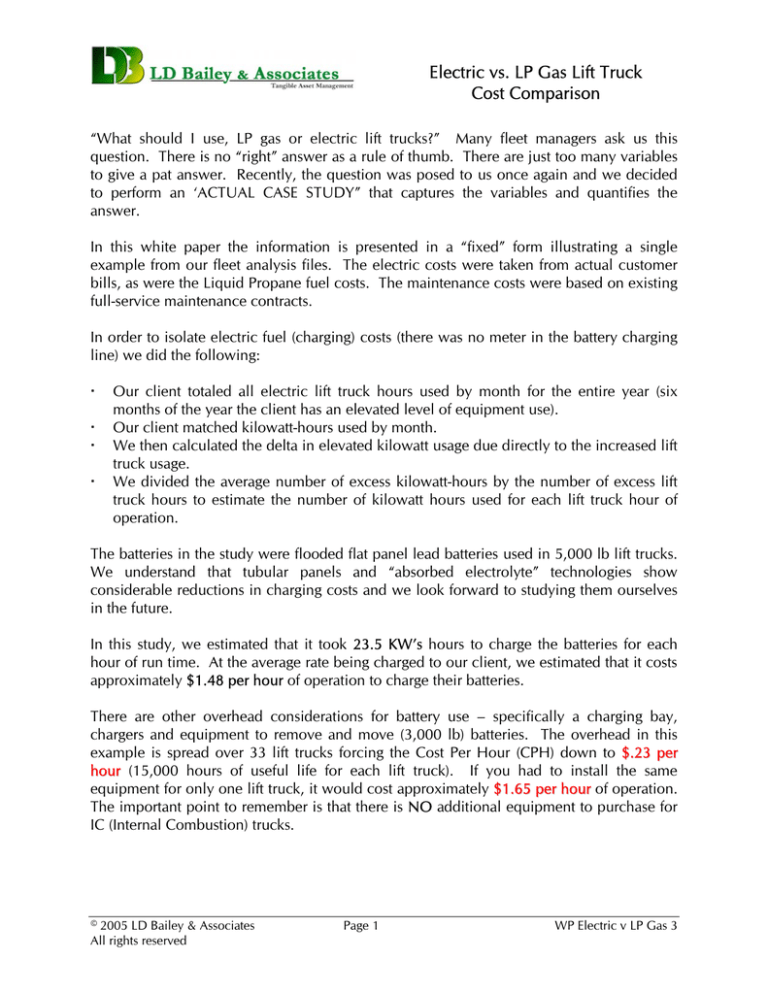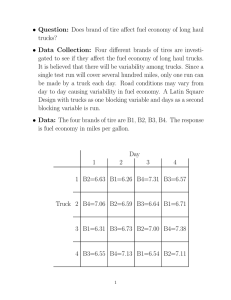
Electric vs. LP Gas Lift Truck
Cost Comparison
“What should I use, LP gas or electric lift trucks?” Many fleet managers ask us this
question. There is no “right” answer as a rule of thumb. There are just too many variables
to give a pat answer. Recently, the question was posed to us once again and we decided
to perform an ‘ACTUAL CASE STUDY” that captures the variables and quantifies the
answer.
In this white paper the information is presented in a “fixed” form illustrating a single
example from our fleet analysis files. The electric costs were taken from actual customer
bills, as were the Liquid Propane fuel costs. The maintenance costs were based on existing
full-service maintenance contracts.
In order to isolate electric fuel (charging) costs (there was no meter in the battery charging
line) we did the following:
Our client totaled all electric lift truck hours used by month for the entire year (six
months of the year the client has an elevated level of equipment use).
Our client matched kilowatt-hours used by month.
We then calculated the delta in elevated kilowatt usage due directly to the increased lift
truck usage.
We divided the average number of excess kilowatt-hours by the number of excess lift
truck hours to estimate the number of kilowatt hours used for each lift truck hour of
operation.
The batteries in the study were flooded flat panel lead batteries used in 5,000 lb lift trucks.
We understand that tubular panels and “absorbed electrolyte” technologies show
considerable reductions in charging costs and we look forward to studying them ourselves
in the future.
In this study, we estimated that it took 23.5 KW’s hours to charge the batteries for each
hour of run time. At the average rate being charged to our client, we estimated that it costs
approximately $1.48 per hour of operation to charge their batteries.
There are other overhead considerations for battery use – specifically a charging bay,
chargers and equipment to remove and move (3,000 lb) batteries. The overhead in this
example is spread over 33 lift trucks forcing the Cost Per Hour (CPH) down to $.23 per
hour (15,000 hours of useful life for each lift truck). If you had to install the same
equipment for only one lift truck, it would cost approximately $1.65 per hour of operation.
The important point to remember is that there is NO additional equipment to purchase for
IC (Internal Combustion) trucks.
© 2005 LD Bailey & Associates
All rights reserved
Page 1
WP Electric v LP Gas 3
Electric vs. LP Gas Cost Comparison (cont.)
Here is a look at the battery overhead needed.
Item
Battery Maintenance
Battery Charger
Battery Washer
Battery Gantry & Racking
Cost of Battery Maint Equipment
Life in months
Internal "hurdle" rate
Residual Value
Monthly Depreciation / "Pmt"
Total Cost of Batt Maint Equipment
Maint Employee Rate per hr
Time to changeout and clean a battery minutes per day
Total Battery Days from B20 & B21 above
Total Employee Cost
Total Batt Maint Cost and Per Hour
Elect. Detail
Calcs
$
$
$
1,800
8,000
10,000
Elec Trk
Total
Costs
Cost
Per
Hour
LP Gas Detail LP Trk Total
Calcs
Costs
Cost
Per
Hour
$ 1,800
$ 8,000
$ 10,000
$ 19,800
60
8.0%
0.0%
$401.47
$
24,088
$
15.00
10
2,500
$625
$ 24,713
$1.65
$
-
$0.00
The LP gas charges were taken directly from customer bills. The only equipment using LP
gas were the lift trucks being studied so we did not have to isolate the fuel costs for LP.
The market price for LP in the area was $1.35 per gallon. Your price may vary especially
with energy / fuel charges constantly changing. The interesting thing to note here is that
“fuel” cost is NOT the item that creates the big disparity of cost on the bottom line.
It would be fascinating to track costs for two identical fleets of lift trucks used in identical
applications, tracking all costs from purchase price to “fuel” consumption, maintenance,
repair, and tire cost. It would take several years, and could be very volatile due things like
oil shortages or power rate volatilities.
The side-by-side cost comparison for the useful economic life of a 5,000 lb capacity
electric forklift truck with no attachments and the same truck using LP Gas is on the
following page.
© 2004 LD Bailey & Associates
All rights reserved
Page 2
WP Electric v LP Gas 3
Electric vs. LP Gas Cost Comparison (cont.)
Item
Truck Cost
Basic 5,000 Lb Lift Truck with straight forks
Elect. Detail
Calcs
$
Total Hrs of Truck useful economic life
Total Days of Truck life @ 6 hrs per day
Working Shifts per Month
Total Truck life in Months
Internal "hurdle" rate
Residual Value
Monthly Depreciation / "Pmt"
LP Trk
Total
Costs
LP Gas Detail
Calcs
$
15,000
2,500
22
Cost
Per
Hour
18,000
15,000
2,500
22
114
8.0%
20.0%
$ 272.99
Batteries "gas tanks" Cost
Hrs of battery use per day (not per shift)
Total hrs of battery life
Total Days of battery life
Total batteries required
$
114
8.0%
20.0%
204.74
$ 31,120
$ 2.07
$
23,340
$ 13,161
$ 0.88
$
-
$
25,200
$ 1.56
6
4,500
750
3
Cost per Battery
$
3,500
Total Cost of Bateries
Life in months
Internal "hurdle" rate
Residual Value
Monthly Depreciation / "Pmt"
$
11,667
36
8.0%
0.0%
$365.59
Total Battery Cost and Per Hour
Electric Fuel Cost
Total Charging KW's for period
Cost per KW
Total Power Cost
Total Hours of Lift Truck Op. for period
Total Electrical Cost and per hour
Cost
Per
Hour
24,000
Total Lift Truck Cost and Per Hour
Lift Truck Maintenance
Current quotes from local vendors
Hrs per month
Cost per month
Maximum hours under contract
Total Maint Cost and Per Hour
Elec Trk
Total
Costs
250
$350
15,000
$
-
250
$420
15,000
$ 21,000
$ 1.40
$ 22,260
$ 1.48
$ 1.68
42,863
$0.0632
$2,710.29
1,826
Propane Fuel Cost
Fuel usage per hour in gals
Propane cost per gallon
Total Electrical Cost and per hour
$
-
1.0459
$1.350
$
21,179
$ 1.41
Total Life Cost of Ownership and
Operations and Per Hour
$ 87,542
$ 5.84
$
69,720
$ 4.65
Add back residual value
Net Total Cost
$ 4,800
$ 82,742
$ 5.52
$
$
3,600
66,120
$ 4.41
$
$
16,622
548,525
Number of Trucks in Fleet
© 2004 LD Bailey & Associates
All rights reserved
33
Per Unit
Total Cost Diff.
Page 3
$ 1.11
WP Electric v LP Gas 3
Electric vs. LP Gas Cost Comparison (cont.)
As you can see in this example, LP Gas units are considerably less expensive to own and
operate. Notice that with electric trucks that you must purchase several additional “fuel
tanks” (batteries) as well as pay a premium for the basic equipment ($24,000 for electric vs.
$18,000 for gas). It is interesting that many would assume from conversations with those
in the industry that electric trucks cost considerably less to operate and maintain.
However, in this case, it doesn’t appear to be true.
It was also interesting to discover that the electric “fuel” costs in this study - $1.48 per hour
of run time for electricity were more than the $1.41 per hour for LP Gas. This was a
surprising finding since we had heard that battery charging costs were miniscule. We
believe that a more accurate explanation is that charging costs are “hidden” in facilities
operating costs. When actually captured (by our method or a separate meter for the
charging circuit), the “fuel” costs will reflect a surprising and more accurate amount.
The overall cost difference in this comparison was approximately $16,622 per unit
($82,742 for electric minus $66,120 for gas) or $1.11 per hour of operation during its
useful economic life (not including the battery maintenance overhead). That means for
every 4 electric lift trucks, this customer could have owned and operated 5 LP Gas trucks.
In our opinion and all other operating variables being equal, we think it would be a better
value for this client to use LP gas trucks rather than electric.
THAT BEING SAID, we understand that there are many other mitigating circumstances
governing your decision – things like flammable conditions requiring EE equipment,
emissions issues (smell), local equipment availability, lease vs. buy strategies and so on.
There are many variables to consider, but having considered them in this case, the results
are compelling.
Note: The comparison “tool” is available for your own analysis. Please send your enquiries
to info@LDBailey.com.
LD Bailey & Associates has extensive industry experience in tangible asset management, financial
analysis, business strategy development, and management technologies. LDB specializes in the
areas of equipment finance, fleet maintenance and management, cost and telemetry reporting, and
has experience in safety compliance. In addition, LD Bailey’s staff also includes experts in load
logistics and black-box telemetry systems. It is their sole purpose to find hidden dollars for clients
in the acquisition, maintenance, operation and liquidation of capital and operating assets.
© 2004 LD Bailey & Associates
All rights reserved
Page 4
WP Electric v LP Gas 3

